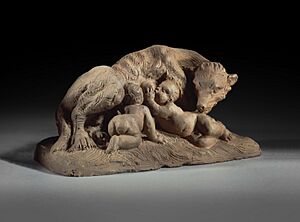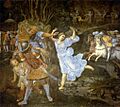Aeneas facts for kids
Quick facts for kids Aeneas |
|
|---|---|
| Founder of Alba Longa | |
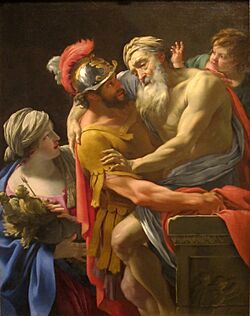
Aeneas and his Father Fleeing Troy, by Simon Vouet (c. 1635).
|
|
| Abode | Alba Longa |
| Personal information | |
| Consort | Creusa Dido Lavinia |
| Offspring | Ascanius (with Creusa) Silvius (with Lavinia) |
| Parents | Anchises and Aphrodite (Venus) |
| Siblings | Lyrus |
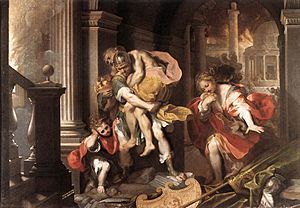
In Greco-Roman mythology, Aeneas was a great hero from the city of Troy. He was the son of the Trojan prince Anchises and the Greek goddess of love, Aphrodite (known as Venus to the Romans). This made him a cousin of the famous Trojan warriors Hector and Paris.
Aeneas is a character in the Greek story of the Trojan War, the Iliad. However, he is most famous as the main character of the Roman epic poem, the Aeneid, written by the poet Virgil. In this story, Aeneas escapes the destruction of Troy and leads his people on a long journey to Italy. There, he becomes an ancestor of Romulus and Remus, the legendary founders of Rome. Because of this, Aeneas is celebrated as the first true hero of Rome.
Contents
The Story of Aeneas in Greek Myths
A Hero in the Trojan War
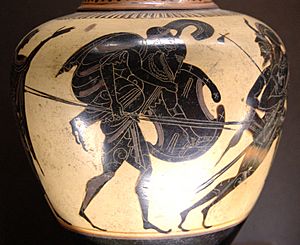
Aeneas is a brave warrior in the Iliad, a story about the Trojan War. He is the leader of the Dardanians, who were allies of the Trojans. He was also a top lieutenant for Hector, the greatest Trojan warrior.
During the war, Aeneas was protected by the gods. His mother, Aphrodite, and the sun god Apollo often saved him from danger on the battlefield. Once, the Greek hero Diomedes almost defeated him, but the gods swept him away to safety. The sea god Poseidon, who usually helped the Greeks, also saved Aeneas from the mighty Achilles. Poseidon knew that Aeneas had a special destiny: to survive the war and become a king for the Trojan people.
Because of his deep respect for the gods, Aeneas was one of the few Trojans spared by the Greeks when they captured the city.
The Great Journey in Roman Legend
The story of Aeneas's adventures after the Trojan War is told in the famous Roman poem, the Aeneid.
Escaping from Troy
When Troy fell to the Greeks, the gods told Aeneas to flee. He gathered a group of survivors, called the Aeneads. He carried his elderly father, Anchises, on his shoulders and led his young son, Ascanius, by the hand. His wife, Creusa, was lost during the escape from the burning city. Aeneas and his followers set sail to find a new home in Italy, carrying the sacred statues of Troy's household gods with them.
Aeneas and Queen Dido
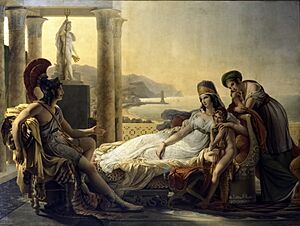
The Trojans sailed for six years, facing many challenges. A fierce storm, sent by the goddess Juno, shipwrecked them on the coast of North Africa. There, they were welcomed in the city of Carthage by its beautiful queen, Dido.
Aeneas and Dido fell in love, and he stayed in Carthage for a year. Dido hoped he would stay and rule Carthage with her. However, the gods sent the messenger Mercury to remind Aeneas of his true mission: to found a new city in Italy.
Aeneas knew he had to obey the gods, so he prepared to leave in secret. When Dido discovered he was leaving, she was heartbroken. In her sadness, she cursed the Trojans and their descendants, saying that Carthage and the future city of Rome would always be enemies. After Aeneas sailed away, Dido died of a broken heart.
Reaching Italy and the Underworld
The Trojans finally reached the coast of Italy. There, Aeneas traveled to the underworld to speak with the spirit of his father, Anchises, who had died earlier in their journey. His father showed him a vision of the future. He saw the great heroes who would be his descendants and the glorious history of Rome, the city they would one day build.
The Final Battle
Aeneas and his people were welcomed by Latinus, the king of the Latins. King Latinus had a daughter named Lavinia. A prophecy had told him that Lavinia should marry a foreigner, not her current suitor, Turnus, the king of a nearby tribe. Latinus decided to offer Lavinia's hand in marriage to Aeneas.
Turnus was furious and declared war on the Trojans. A long and difficult battle followed. In the end, Aeneas faced Turnus in a one-on-one duel and defeated him. By winning the battle and marrying Lavinia, Aeneas united the Trojans and the Latins. He founded a new city called Lavinium, named after his wife.
Aeneas's Family and Legacy
Aeneas had two sons: Ascanius with his first wife Creusa, and Silvius with Lavinia. Ascanius went on to found the city of Alba Longa, where a long line of kings ruled.
According to legend, the founders of Rome, Romulus and Remus, were distant descendants of Aeneas through their mother, Rhea Silvia. This made Aeneas the ancestor of all Roman people. Famous Roman leaders, like Julius Caesar and the emperor Augustus, claimed to be descended from Aeneas and his mother, the goddess Venus.
After his death, the gods made Aeneas immortal, and he was worshipped as a local god called Jupiter Indiges.
Character and Appearance
In stories, Aeneas is often called pius, a Latin word that means he was very dutiful and respectful to his family, his country, and the gods. He is described as strong and handsome.
An ancient writer named Dares Phrygius described Aeneas as having "auburn-haired, stocky, eloquent, courteous, prudent, pious, and charming. His eyes were black and twinkling."
Aeneas in Art
The story of Aeneas has been a popular subject for artists for thousands of years. Many paintings and sculptures show scenes from his life, especially his escape from Troy and his adventures from the Aeneid.
Villa Valmarana
In 1757, the artist Giovanni Battista Tiepolo painted rooms in an Italian villa with scenes from the Aeneid.
-
Aeneas Introducing Cupid Dressed as Ascanius to Dido, by Tiepolo (1757).
Aeneas flees Troy
-
Aeneas fleeing from Troy, by Pompeo Batoni (c. 1750).
Aeneas with Dido
-
The Meeting of Dido and Aeneas, by Nathaniel Dance-Holland (1766)
-
Landscape with Dido and Aeneas, by Thomas Jones (1769)
-
Dido meeting Aeneas, by Johann Heinrich the Elder Tischbein (3 January 1780)
Family tree
|
|||||||||||||||||||||||||||||||||||||||||||||||||||||||||||||||||||||||||||||||||||||||||||||||||||||||||||||||||||||||||||||||||||||||||||||||||||||||||||||||||||||||||||||||||||||||||||||||||||||||||||||||||||||||||||||||||||||||||||||||||||||||||||||||||||||||||||||||||||||||||||||||||||||||||||||||||||||||||||||||||||||||||||||||||||||||||||||||||||||||||||||||||||||||||||||||||||||||||||||||||||||||||||||||||||||||||||||||||||||||||||||||||||||||||||||||||||||||||||||||||||||||||||||||||||||||||||||||||||||||||||||||||||||||||||||||||||||||||||||||||||||||||||||||||||||||||||||||||||||||||||||||||||||||||||||||||||||||||||||||||||||||||||||||||||||||||||||||||||||||||||||||||||||||||||||||||||||||||||||||||||||||||||||||||||||||||||||||||||||||||||||||||||||||||||||||||||||||||||||||||||||||||||||||||||||||||||||||||||||||||||||||||||||||||||||||||||||||||||||||||||||||||||||||||||||||||||||||||||||||||||||||||||||||||||||||||||||||||||||||||||||||||||||||||||||||||||||||||||||||
Related pages
Images for kids
-
Venus as Huntress Appears to Aeneas, by Pietro da Cortona
See also
 In Spanish: Eneas para niños
In Spanish: Eneas para niños
 | Anna J. Cooper |
 | Mary McLeod Bethune |
 | Lillie Mae Bradford |


